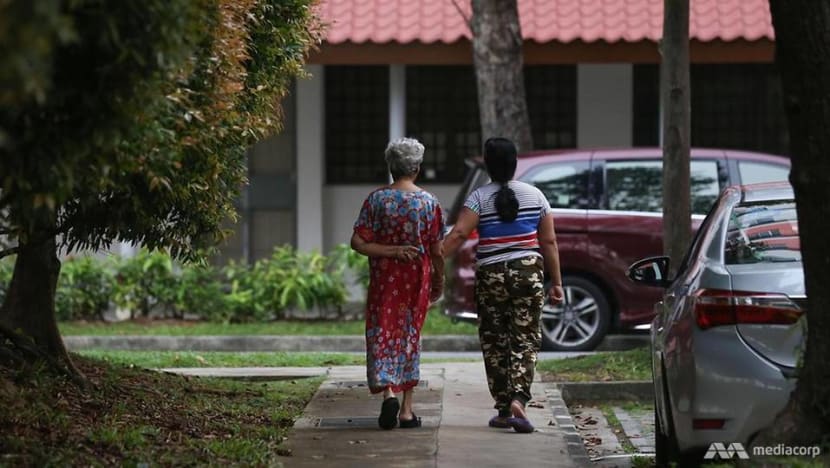Employers must provide maids with rest day that cannot be compensated away: MOM

A foreign domestic helper is seen strolling with an elderly woman on Oct 31, 2019. (File photo: TODAY/Najeer Yusof)
SINGAPORE: People in Singapore who employ foreign maids will have to provide them with at least one rest day a month that cannot be compensated away, said the Ministry of Manpower (MOM) on Thursday (Jul 22).
This new measure is one of several the ministry will be implementing to help strengthen support for maids and their well-being, said MOM in a press release.
"Employers will be required to provide their MDWs (migrant domestic workers) with at least one rest day a month that cannot be compensated away.
"This will provide more opportunities for MDWs to form a network of support outside the household, as well as rest and recharge from work," said the ministry.
The mandatory rest day policy will take effect in end-2022. MOM said it understands that some employers may need time to "adjust to the new rest day arrangements".
READ: The Big Read: To stop abuse of foreign domestic workers, stop the power imbalance
READ: IN FOCUS: The challenges in uncovering abuse of foreign domestic workers
The new measures come after a review by MOM, which included consultations with stakeholders such as those who employ maids, employment agencies, non-governmental organisations and doctors.
MOM said these measures were developed with two broad objectives - to help both maids and employers settle into a "mutually beneficial working relationship" and to detect signs of abuse "more quickly".
"We recognise that MDWs may face challenges in adjusting to work and life in Singapore. Similarly, employers may also face difficulties in accommodating a new person into their household," said the ministry.
It also aimed to detect signs of abuse more quickly by "enhancing current touchpoints", as well as to help maids build a wider network of support beyond their households.
READ: Myanmar maid's death: MOM reviewing how doctors report potential abuse
READ: Pilot programme to facilitate safe entry of foreign maids amid COVID-19
VARIOUS MEASURES TO BE IMPLEMENTED PROGRESSIVELY
Other measures, which will be implemented progressively, include enhancing the six-monthly medical examination for maids to better pick up any signs of abuse.
Doctors will be required to record the maids' body-mass index and check for signs of suspicious and unexplained injuries. They will need to submit these records to MOM for follow-up if necessary.
This process will be implemented by the third quarter of 2021.
Another measure is the implementation of post-placement checks by employment agencies. The move, to be put in place in the fourth quarter of 2021, is to ensure that maids and employers are adjusting well, and to offer support if needed.
"As the intermediary that facilitates matches between migrant domestic workers and employers, employment agencies play an important role in helping both parties build strong relationships," said MOM.
READ: MOM may require employment agencies to check in on foreign domestic workers: Gan Siow Huang
READ: MOM may impose stiffer penalties on employers who illegally deploy foreign domestic workers
Maids will also be interviewed twice in their first year of work, up from once currently. This builds upon an earlier announced expansion of such interviews to cover all first-time maids by the end of the year.
"This will provide migrant domestic workers and their employers with more opportunities to raise and resolve issues, and settle into their working relationship," said the ministry.
To facilitate these in-person interviews, MOM will set up three neighbourhood centres in partnership with the Centre for Domestic Employees. The first neighbourhood centre is targeted to be operational by the first quarter of 2022.
The ministry said more details on their various initiatives will be shared in due course.
"Taking care of our migrant domestic workers will require a whole-of-society effort.
"We would like to encourage everyone to play a part in building a culture of respect and care for migrant domestic workers, in our homes and our communities," said MOM.












